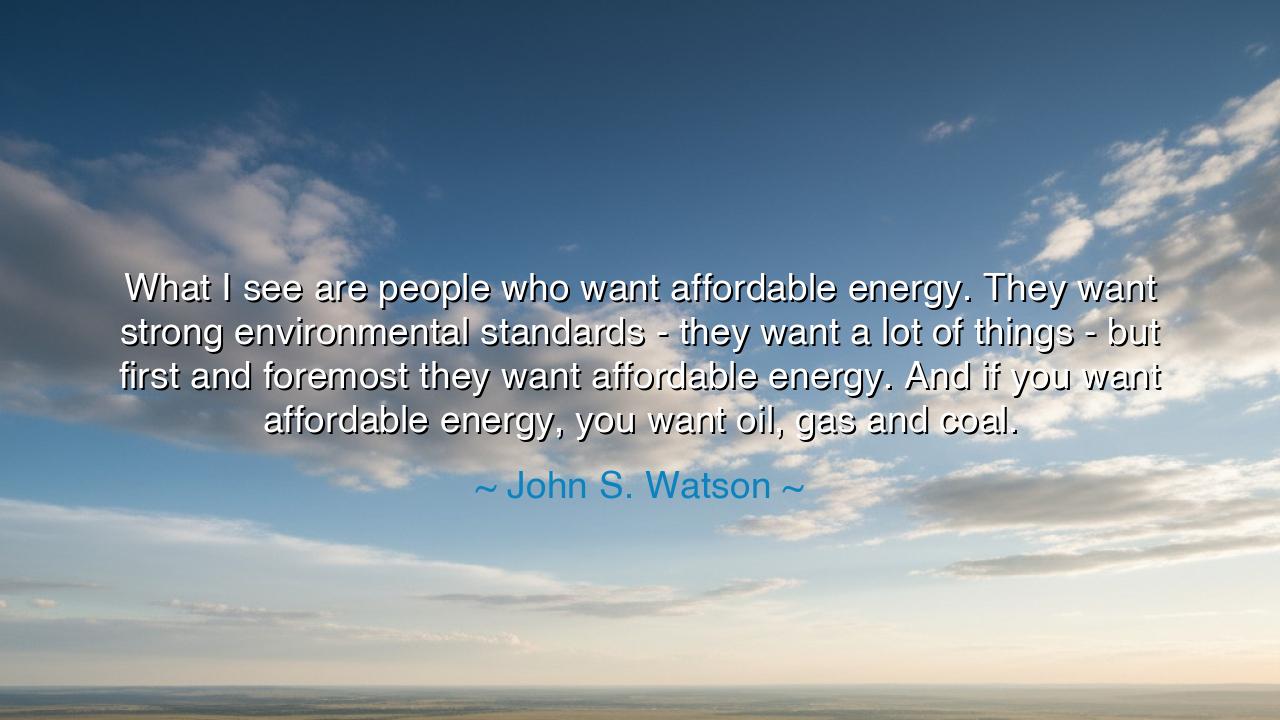
What I see are people who want affordable energy. They want
What I see are people who want affordable energy. They want strong environmental standards - they want a lot of things - but first and foremost they want affordable energy. And if you want affordable energy, you want oil, gas and coal.






Hear the words of John S. Watson, once a leader in the great engines of commerce, who declared: “What I see are people who want affordable energy. They want strong environmental standards—they want a lot of things—but first and foremost they want affordable energy. And if you want affordable energy, you want oil, gas and coal.” This is not merely the voice of industry, but a mirror held up to the desires of humankind. For while the people speak of clean skies and rivers preserved, their first cry is often for warmth in winter, light in darkness, and the power that drives their homes and cities.
The meaning is layered and complex. Watson unveils the tension between affordable energy and environmental standards, two desires that wrestle within the hearts of modern societies. Men and women wish to protect the earth, yet they also demand energy that does not impoverish them. Thus, the rulers of nations and the masters of industry are caught between duty to the present and duty to the future. Oil, gas, and coal—the fossil fuels—have long been the foundation of cheap and abundant power. They lit the lamps of the nineteenth century, fueled the factories of the twentieth, and still, in the twenty-first, they roar in the furnaces and engines that sustain civilization.
Consider the tale of Britain’s Industrial Revolution. It was coal that stoked the fires of invention, coal that gave birth to steel, locomotives, and the engines of empire. Without it, the age of machines would not have dawned, and progress would have been delayed for centuries. Yet even as coal lifted nations into prosperity, it blackened their skies and poisoned their air. London, by the mid-twentieth century, was so choked by smog that thousands perished in the “Great Smog” of 1952. Here lies the paradox revealed in Watson’s words: that which grants life and power may also carry death and decay.
Watson’s statement is born of his role as head of Chevron, one of the great oil companies of the modern era. He spoke not as a philosopher but as a steward of industry, naming the desires he witnessed in people across nations. For while governments debate and scientists warn of climate peril, ordinary citizens cry first for affordable fuel, for the means to drive to work, to cook food, to heat their homes. Their longing for environmental purity often falters when weighed against the hunger of their children or the burden of rising costs.
Yet the teaching is not without hope. For though oil, gas, and coal have been the pillars of affordable energy, they need not remain so forever. History is filled with transformations. Just as mankind once passed from wood to coal, and from candles to electricity, so too can the age of renewables rise, if wisdom and will align. Solar, wind, and other sources, though once costly, now draw nearer to the dream of abundance without destruction. What Watson revealed is not destiny, but the reality of the present hunger; it is for future generations to decide how that hunger shall be fed.
The lesson for us is clear: we must balance the cries of the present with the needs of the future. Let no one despise the poor for seeking cheap energy, for survival cannot wait on idealism. But let no one dismiss the peril of binding ourselves forever to fuels that wound the earth. Each citizen, each leader, must strive to hasten the day when affordable energy is also clean energy, so that humanity need not choose between poverty and pollution.
Practical action calls us to vigilance: support policies and innovations that bring down the cost of renewables, hold corporations accountable to both affordability and sustainability, and make choices in your own life that point toward conservation and wise use. For though the engines of oil, gas, and coal still thunder, the seeds of a new age have already been planted.
So remember this truth: Watson’s words reflect the hunger of today, but not the destiny of tomorrow. If the people cultivate wisdom, courage, and patience, then future generations may one day look back and say: once we depended on fuels that chained us, but now we walk in the light of energy that sustains life without destroying it. And in that day, affordable energy and environmental harmony shall no longer be foes, but allies.






AAdministratorAdministrator
Welcome, honored guests. Please leave a comment, we will respond soon